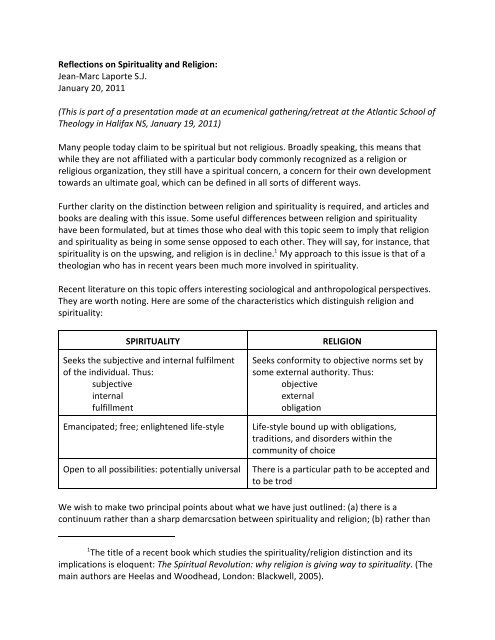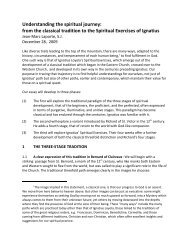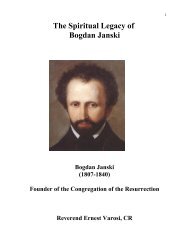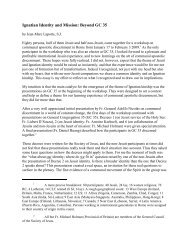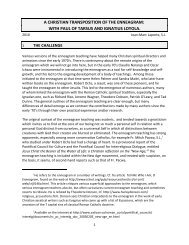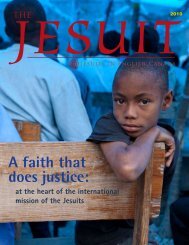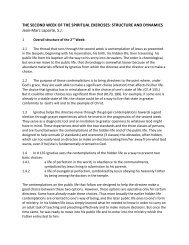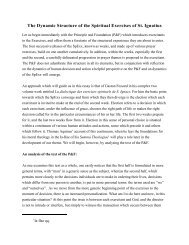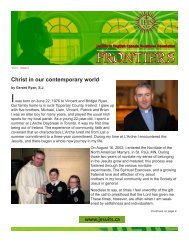Reflections on Spirituality and Religion: Jean-Marc Laporte S.J. ...
Reflections on Spirituality and Religion: Jean-Marc Laporte S.J. ...
Reflections on Spirituality and Religion: Jean-Marc Laporte S.J. ...
Create successful ePaper yourself
Turn your PDF publications into a flip-book with our unique Google optimized e-Paper software.
<str<strong>on</strong>g>Reflecti<strong>on</strong>s</str<strong>on</strong>g> <strong>on</strong> <strong>Spirituality</strong> <strong>and</strong> Religi<strong>on</strong>:<strong>Jean</strong>-<strong>Marc</strong> <strong>Laporte</strong> S.J.January 20, 2011(This is part of a presentati<strong>on</strong> made at an ecumenical gathering/retreat at the Atlantic School ofTheology in Halifax NS, January 19, 2011)Many people today claim to be spiritual but not religious. Broadly speaking, this means thatwhile they are not affiliated with a particular body comm<strong>on</strong>ly recognized as a religi<strong>on</strong> orreligious organizati<strong>on</strong>, they still have a spiritual c<strong>on</strong>cern, a c<strong>on</strong>cern for their own developmenttowards an ultimate goal, which can be defined in all sorts of different ways.Further clarity <strong>on</strong> the distincti<strong>on</strong> between religi<strong>on</strong> <strong>and</strong> spirituality is required, <strong>and</strong> articles <strong>and</strong>books are dealing with this issue. Some useful differences between religi<strong>on</strong> <strong>and</strong> spiritualityhave been formulated, but at times those who deal with this topic seem to imply that religi<strong>on</strong><strong>and</strong> spirituality as being in some sense opposed to each other. They will say, for instance, that1spirituality is <strong>on</strong> the upswing, <strong>and</strong> religi<strong>on</strong> is in decline. My approach to this issue is that of atheologian who has in recent years been much more involved in spirituality.Recent literature <strong>on</strong> this topic offers interesting sociological <strong>and</strong> anthropological perspectives.They are worth noting. Here are some of the characteristics which distinguish religi<strong>on</strong> <strong>and</strong>spirituality:SPIRITUALITYSeeks the subjective <strong>and</strong> internal fulfilmentof the individual. Thus:subjectiveinternalfulfillmentEmancipated; free; enlightened life-styleOpen to all possibilities: potentially universalRELIGIONSeeks c<strong>on</strong>formity to objective norms set bysome external authority. Thus:objectiveexternalobligati<strong>on</strong>Life-style bound up with obligati<strong>on</strong>s,traditi<strong>on</strong>s, <strong>and</strong> disorders within thecommunity of choiceThere is a particular path to be accepted <strong>and</strong>to be trodWe wish to make two principal points about what we have just outlined: (a) there is ac<strong>on</strong>tinuum rather than a sharp demarcsati<strong>on</strong> between spirituality <strong>and</strong> religi<strong>on</strong>; (b) rather thanThe title of a recent book which studies the spirituality/religi<strong>on</strong> distincti<strong>on</strong> <strong>and</strong> its1implicati<strong>on</strong>s is eloquent: The Spiritual Revoluti<strong>on</strong>: why religi<strong>on</strong> is giving way to spirituality. (Themain authors are Heelas <strong>and</strong> Woodhead, L<strong>on</strong>d<strong>on</strong>: Blackwell, 2005).
oppose each other, spirituality <strong>and</strong> religi<strong>on</strong> complement <strong>and</strong> enrich each other.The C<strong>on</strong>tinuum between <strong>Spirituality</strong> <strong>and</strong> Religi<strong>on</strong>: The extreme of spirituality is the plane thatflies around but never l<strong>and</strong>s. The extreme of religi<strong>on</strong> is the plane that is stuck <strong>on</strong> the groundbut never flies. In the first case you have beautiful <strong>and</strong> universal spiritual values but theyremain in an ethereal realm, with no embodiment of the universal values in the here <strong>and</strong> now,no incarnati<strong>on</strong>, or in Pauline terms, no kenosis or emptying out. In the sec<strong>on</strong>d you have astifling particularity in which the pers<strong>on</strong> is impris<strong>on</strong>ed by deadening observances, shackled to ac<strong>on</strong>stricting image of himself or herself. Both of these extremes are to be shunned. There is ac<strong>on</strong>tinuum between the two extremes al<strong>on</strong>g which healthy pers<strong>on</strong>s should be situatingthemselves. Depending <strong>on</strong> temperament, earlier nurture, pers<strong>on</strong>al history, that place might becloser to spirituality or to religi<strong>on</strong>. Indeed in most cases both will be present in a unique blend.Two not untypical examples:Many might practice a religi<strong>on</strong>, but in a cafeteria style that moves them in the directi<strong>on</strong>of spirituality <strong>and</strong> its universality. They pick <strong>and</strong> choose what to believe, whatobservances to adopt, which authorities they will listen to, which parish they will bel<strong>on</strong>gto, often to the dismay of instituti<strong>on</strong>al leaders. This is certainly my experience as aCatholic priest. People who do not find the ministry of Father X in parish Y helpful go toParish Z. People pick <strong>and</strong> choose which doctrines <strong>and</strong> comm<strong>and</strong>ments will have animpact in their life. For example, some might be committed to social justice, but theissues of sexual morality that loom large in official magisterial teaching do not havemuch impact <strong>on</strong> them. For others the be-all <strong>and</strong> end-all is adherence to themagisterium in areas of sexual morality, <strong>and</strong> what pertains to social justice is in effectignored. For people of both types. the Pope is an inspiring pers<strong>on</strong>, except when hepreaches <strong>on</strong> a particular topic which leaves them cold. They acclaim him but do notreally take his words seriously. For them there is no seamless garment. Some measureof ranging out of <strong>on</strong>e’s traditi<strong>on</strong> to find complementary practices is very healthy, forexample a Christian who finds benefit in Yoga or Zen techniques. But in other cases thesearch for novelty is an escape from the burdens of <strong>on</strong>e’s own commitments.Others might see themselves as spiritual, but as they learn the ABC of this or that formof spirituality they find that there are exercises, practices, a regularity to be implantedinto <strong>on</strong>e’s life. They impose c<strong>on</strong>straints <strong>on</strong> themselves, c<strong>on</strong>straints akin to those of atraditi<strong>on</strong>al religi<strong>on</strong>. In a real sense the spiritual path they have chosen becomes areligi<strong>on</strong>. One could be enthusiastic about Eastern spirituality, dabble in this or thatparticular practice, or else <strong>on</strong>e might decide to fully enter into the particular Easternspiritual path to which they feel called, <strong>and</strong> to practice it wholeheartedly <strong>and</strong>c<strong>on</strong>sistently. Indeed a form of spirituality, as it gathers together disciples, organizesitself. The structure may remain light <strong>and</strong> minimal, but if it develops a instituti<strong>on</strong>al cast,<strong>on</strong>e would refer to the movement as a religi<strong>on</strong> rather than a spirituality.In both of these examples, there emerges the need for resp<strong>on</strong>sible choice., which meanscommitment. To return to the metaphor of the mountain top: <strong>on</strong>e can visualize, affirm <strong>and</strong>
maybe even explore to some extent the different pathways to the top of the mountain, butunless <strong>on</strong>e chooses a particular path <strong>and</strong> leaves the others behind, <strong>and</strong> follows the markers ashe or she climbs, with much struggle <strong>and</strong> effort, <strong>on</strong>e does not make it to the top.The complementarity of spirituality <strong>and</strong> religi<strong>on</strong>: If we seek a deeper underst<strong>and</strong>ing of bothspirituality <strong>and</strong> religi<strong>on</strong>, we find that at heart they do not oppose each other but enrich eachother:Pers<strong>on</strong>s who are religiously observant will be led by their observance to develop theirown spirituality, in accord with the unique promptings of the Spirit within each <strong>on</strong>e ofthem. If their religi<strong>on</strong> does not make room for a pers<strong>on</strong>al development which issp<strong>on</strong>taneous <strong>and</strong> free, it is not a religi<strong>on</strong> but a cult, <strong>and</strong> we have examples in our recenthistory of how dangerous <strong>and</strong> lethal cults can be. Indeed at the heart of every religi<strong>on</strong>there is a spirituality which has been in some sense codified. For example, the creed,code <strong>and</strong> cult of Christianity is rooted in the rich <strong>and</strong> unparalleled spiritual experienceof Jesus. This spirituality has to be accessible in an unfettered way to each individual.Otherwise the religi<strong>on</strong> fetters <strong>and</strong> shackles rather than liberates. Likewise pers<strong>on</strong>s who are spiritually active will, as they develop their own spirituality,seek out a suitable community, knowing <strong>and</strong> accepting that it will have limitati<strong>on</strong>s,quirks, weaknesses, troublesome people. A self-enclosed spirituality without outreach,relati<strong>on</strong>ships <strong>and</strong> a community can easily fall into narcissism. It is not sufficient to beuniversal; we need to take root, become enfleshed in the here <strong>and</strong> now, <strong>and</strong> we needto make choices. I ultimately fulfill myself to the extent that I give of myself, let go ofmyself, enter into relati<strong>on</strong>s <strong>and</strong> communities which shape my life. There is a messinessinherent to human living, a messiness which will test us <strong>and</strong> shape us according to thelaw of love, <strong>and</strong> we are wr<strong>on</strong>g to pretend that we are <strong>on</strong> a higher spiritual plane whichexempts us from being fully human.From a Christian point of view, these two poles of spirituality <strong>and</strong> religi<strong>on</strong> respectivelyrepresent the activity of the Spirit <strong>and</strong> the activity of the Word (S<strong>on</strong>) in our world. Both arerequired <strong>and</strong> work in coordinati<strong>on</strong>, as we see in Gal 4:4-7. They are complementary: the Wordbursts <strong>on</strong>to the human stage as an objective presence within the space <strong>and</strong> time which is thestage of human history, becoming incarnate. But then the Spirit is poured within our hearts(the subjective side) so that we might be able to receive the Word in a way that touches ouruniqueness. The religi<strong>on</strong> side with its objectivity, its practices, its historical presence <strong>and</strong>traditi<strong>on</strong>s, c<strong>on</strong>nects with the Word. The spirituality side, with its inner experience <strong>and</strong>transformati<strong>on</strong>, c<strong>on</strong>nects with the Spirit. Just as you cannot have the Spirit being activewithout the Word being active <strong>and</strong> vice versa, so too you cannot have spirituality without someform of religi<strong>on</strong> <strong>and</strong> vice-versa.So if we are pers<strong>on</strong>s given to spirituality, let us remember that our spirituality, if authentic, willlead us to embrace the sc<strong>and</strong>al of particularity: we cannot be everything, we have to choose:this community, this particular practice of prayer, this set of teachings, of spiritual practices, of
moral <strong>and</strong> social commitments, will be the organizing principle of our lives rather that that <strong>on</strong>e.And we need to take the time <strong>and</strong> the effort to make this particular community <strong>and</strong> itspractices a part of ourselves just as our family is part of ourselves. We need to grow roots by aliving stream. And if we are pers<strong>on</strong>s given to religi<strong>on</strong>, let us remember that our religi<strong>on</strong> if fullyembraced will led us to let go of what is familiar in our regular religious practices to explore, toenter into the path of fuller development according to the rhythms of the Spirit, to discoverthe wealth of spirituality at the heart of that religi<strong>on</strong> <strong>and</strong> perhaps other complementarypractices. This is an area where for us to be authentic is also for us to be unique. The religiousrituals <strong>and</strong> prayers <strong>and</strong> practices might be the same, but the Spirit speaks differently to each<strong>on</strong>e who is faithful to them.


